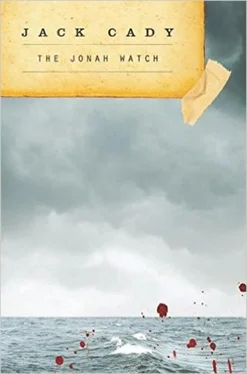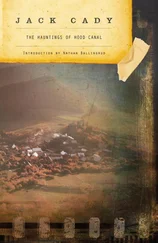Джек Кейди - The Jonah Watch
Здесь есть возможность читать онлайн «Джек Кейди - The Jonah Watch» весь текст электронной книги совершенно бесплатно (целиком полную версию без сокращений). В некоторых случаях можно слушать аудио, скачать через торрент в формате fb2 и присутствует краткое содержание. Год выпуска: 2014, ISBN: 2014, Издательство: Underland Press, Жанр: Морские приключения, sf_mystic, на английском языке. Описание произведения, (предисловие) а так же отзывы посетителей доступны на портале библиотеки ЛибКат.
- Название:The Jonah Watch
- Автор:
- Издательство:Underland Press
- Жанр:
- Год:2014
- ISBN:978-1-63023-021-0
- Рейтинг книги:3 / 5. Голосов: 1
-
Избранное:Добавить в избранное
- Отзывы:
-
Ваша оценка:
- 60
- 1
- 2
- 3
- 4
- 5
The Jonah Watch: краткое содержание, описание и аннотация
Предлагаем к чтению аннотацию, описание, краткое содержание или предисловие (зависит от того, что написал сам автор книги «The Jonah Watch»). Если вы не нашли необходимую информацию о книге — напишите в комментариях, мы постараемся отыскать её.
The Jonah Watch — читать онлайн бесплатно полную книгу (весь текст) целиком
Ниже представлен текст книги, разбитый по страницам. Система сохранения места последней прочитанной страницы, позволяет с удобством читать онлайн бесплатно книгу «The Jonah Watch», без необходимости каждый раз заново искать на чём Вы остановились. Поставьте закладку, и сможете в любой момент перейти на страницу, на которой закончили чтение.
Интервал:
Закладка:
Through the years certain questions haunted that incident of youth. I thought about them on the plane. What happened to the child? What did Tommy see as he kicked the forty footer ahead? What, for that matter, did I see? I am old now, and am well acquainted with the way the mind manufactures illusions. What did Wert see? What caused a puritanical lobsterman to suddenly sink into the depths of insanity; for the lobstermen of Maine are usually stern and steady fellows.
After checking into a Portland hotel I went to the newspaper office and was extended every courtesy. The report from so many years ago seemed sketchy, but it did contain the names of men and the name of the child. The child, it was reported, had been taken away by her grandmother before the ugly murder.
So much time had passed it was unlikely the grandmother still lived. I searched the phone book. The grandmother was not listed, but the child’s name was. Of course, she would now be a middleaged woman. I phoned, made clumsy explanations, and she agreed to meet me for lunch.
To an aging man, the woman who met me in the hotel lobby seemed to shine with both dignity and beauty. The coast of Maine is hard on men, but often even harder on women. This slim lady’s face was weathered, crow’s-feet around bright gray eyes, and her hands showed that she was not afraid of work. Long, dark hair displayed streaks of gray, and her conservative gray dress fell well below the knee.
“It’s a jigsaw puzzle,” she told me once we were seated for lunch. “You must remember that I was little more than a baby.”
“I wonder what is happening in the harbor,” I said. “The newspaper plays this for laughs.” Beyond the windows, banks of piled snow lined streets that are asphalt now, but in my day were brick. Sun glistened on patches of ice, and the thermometer stood at zero.
“I know exactly,” she told me. “I own a ship chandlery. The story comes together in bits and pieces. Men talk even when they want to keep quiet.”
Men heard more than they saw. In winter darkness of early mornings, when ice fog covered the channel, fishermen reported the low sound of diesels. There would be a nearly hysterical cry of, “Left rudder. Left rudder.” When that happened men became terrified, and minded their own craft. A radar screen may be completely blank, but no sailor trusts the things, and no sailor fails to react when his vision is muffled by fog.
The sound of engines would then rise to a roar, as men blindly threw their helms over to get away. Then would come a great rip and tearing of metal and wood; and then silence. Into the silence a voice would speak: “A sailor’s pay. A sailor’s pay.”
Men reported the voice as unworldly, or as worldly as the voice of the sea. They then heard the diminishing struggle of men overboard.
“I’ll tell what my grandmother told,” the woman said. She smiled as if distracted. “The people of Maine have a reputation for being taciturn, but among themselves they chatter like jays.” She hesitated, and then made a whispered confession. “I never married. Old-fashioned, maybe, and partly superstitious. My father was insane, my mother no better.”
“If this is too difficult for you….”
“I never really knew them,” she reminded me, “but my grandmother was my best friend.”
Beyond the windows bright colors of automobiles contrasted with piled snow and sun-glazed streets. Tall buildings rose to cast dark shadows beside the busy docks.
“Maine used to resemble Alaska,” the woman said. “In Alaska people still know each other.”
She was right about that. There is still, in Alaska, the feeling that ‘we are all in this together’. When Alaskans meet in improbable places, say Indiana or Australia, they either know each other, or find that they have mutual friends. It’s a big state with a small population.
“This was an incident of war,” she told me. “Or, maybe it was an incident of youth. The sailor named Tommy came to visit my grandmother on two occasions. He knew my father. During the war they both sailed from this port. My father served aboard a freighter. Tommy sought forgiveness for my father’s death.”
Old memories stirred. At last there seemed to be some sense to all of this.
Her father, it developed, was one of the survivors from the torpedoing when Tommy followed that fateful order to drop depth charges. Her father was concussed, suffering what must have been awful brain damage. Her mother, who had a reputation for being fey, met his changed condition by sinking into a virulent brand of New England religion. She played the role of saint to his role of hapless sinner before an avenging God. It proved the wrong approach.
“I don’t forgive my father,” she said. “I don’t even excuse him. There is no excuse for murder.”
She was correct, of course. No one worth a dime resorts to murder, no matter how crazy he gets. Still, most murders come from situations and passions.
“Tommy believed himself doomed,” the woman told me. “He felt that fate pushed him into a world where he was forced to kill my father. The depth charges failed, and it was terrible for him to think that he was forced to kill a man after failing to kill him the first time.” She smiled, but the smile was small and tight. “Don’t be fooled. If the roles were reversed my father might have done the same thing, and reacted in the same way.”
The woman prepared to leave, returning to her everyday work and everyday life. “Try to think about the minds of the men,” she said. “And think about the sea, because the incident is only that, an incident.”
I saw that she did not know more than she told, but that she thought more than she would say.
“Darkness tries to kill light,” she murmured. “That is the business of darkness.” As I helped her into her coat she added: “Remember that all of you were very young. My father was twenty-five, and Tommy could have been little more.”
I thought of the immemorial voice of the sea as I sought to rent a boat. The sea speaks with the sounds of thunder, or it is susurrus, or it hisses, or it murmurs. It is nearly as ancient as the earth. The sea has swallowed men who have spoken a thousand different languages: it has taken into its restless maw Persians, Phoenicians, Romans, Spaniards and Englishmen.
And I thought of Maine and of Portland Harbor while checking the engine of a rented workboat, that, like myself, neared the end of its working life. A thousand vessels have died in these harsh waters, while on land people erected crosses facing the sea. Many of the graves of Maine are invested only by memories.
And I thought of youth, and of the great passions and inarticulateness of youth. I did not wonder why Tommy felt the need to strike out. It is clear that he was quiet because he was too young to mobilize words and alter his confusion. Little wonder he felt doomed.
And, as ice fog began to settle over the harbor around midnight, I thought of Wert. If the sea would not forgive Wert, if, in fact, the unforgiving sea had reached ashore for Wert by using a barnacled buoy, I could still understand. He had been a kid confronted by madness, and he had no experience with madness.
Finally, as I got underway, I thought of Case. He still stood in memory as the finest man I’ve known. I wondered if the memory were true.
The old boat ran smoothly enough. The gasoline engine puttered as I traced the starboard shoreline. Fog lay heavy above me, and tendrils of fog began to reach toward the surface of the restless and flowing water. The tide was running. Along the coast of Maine it will rise or drop seventeen feet during winter. I searched my memories, of Case smiling, teaching a young sailor how to bend lines, and of Case coaxing the roughness from an engine, as if the engine were a living thing.
Читать дальшеИнтервал:
Закладка:
Похожие книги на «The Jonah Watch»
Представляем Вашему вниманию похожие книги на «The Jonah Watch» списком для выбора. Мы отобрали схожую по названию и смыслу литературу в надежде предоставить читателям больше вариантов отыскать новые, интересные, ещё непрочитанные произведения.
Обсуждение, отзывы о книге «The Jonah Watch» и просто собственные мнения читателей. Оставьте ваши комментарии, напишите, что Вы думаете о произведении, его смысле или главных героях. Укажите что конкретно понравилось, а что нет, и почему Вы так считаете.












